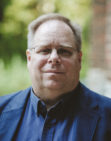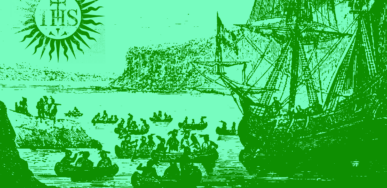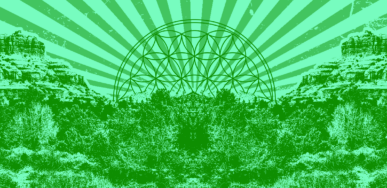Holy Oil
Martien Halvorson-Taylor [00:00:00] I'm Martien Halvorson-Taylor.
Kurtis Shaeffer [00:00:01] And I'm Kurtis Shaeffer.
Martien Halvorson-Taylor [00:00:03] And this is Sacred and Profane. This episode is part of our ongoing series on climate change and religions in the United States. We call it Between Heaven and Earth. And the big question we're looking at is how religion has shaped the way Americans think about, and live on, the land, and how the land has shaped religion. Last episode, we took you to a lake in upstate New York to understand how a series of decrees from the Catholic Church from hundreds of years ago created a lasting legal framework in the United States that still governs how many of us understand and engage the land today.
Kurtis Shaeffer [00:00:53] Those decrees gave European colonists free license to claim and exploit any land that didn't already belong to Christians. And as we talked about in the last episode, this understanding of the land infused colonial governance more broadly in the United States. On this episode, we'll be looking at the intimate connections between American Christianity and one of the most powerful and consequential industries in human history.
Martien Halvorson-Taylor [00:01:19] That's right. Today we're talking about oil. You can argue that the modern oil industry really starts beneath the earth of western Pennsylvania. In 1859, a former railroad conductor named Edwin Drake sunk a well nearly 70 feet down in a field outside of the small town of Titusville. He wasn't looking for water, which Pennsylvania has plenty of. He was looking for rock oil, petroleum. And after five months of drilling, he finally found it in abundance. His discovery would kick off America's first oil boom.
Darren Dochuk [00:02:07] Well, Pennsylvania oil is discovered at a propitious time.
Kurtis Shaeffer [00:02:11] That's historian Darren Dochuk.
Darren Dochuk [00:02:13] I'm Darren Dochuk, professor of history at the University of Notre Dame, where I study and write about and teach on religion, energy, and environment in American life.
Kurtis Shaeffer [00:02:23] He says that in many ways, Drake's discovery couldn't have come at a better time for the United States.
Darren Dochuk [00:02:34] What oil does is, initially at least, provide an alternative illuminant to light homes and industry. Prior to this point, we had other options, most notably whale oil. And this is, of course, running out by the 1850s. Whaling itself is beginning to fail. Petroleum is going to appear at that moment when it can supply American economy, American society with an alternative illuminant. By the late 19th century, of course, with the emergence of the combustible engine, it will also acquire new status as the most important fuel for the American economy as well.
Kurtis Shaeffer [00:03:14] Not only did Pennsylvania's abundant petroleum seem to come along just as the whaling industry was failing, it also boomed as the Civil War raged. To many northerners, the timing felt miraculous, perhaps even a sign of God's favor. Here was a lucrative new industry to replace a dying one. And surely it wasn't a mistake that oil was making men rich in a free state that fought for the union.
Darren Dochuk [00:03:41] Oil is going to step in at a critical juncture in American life. It is discovered during the Civil War, a point at which the American economy is struggling, a point at which the nation itself is, is highly divided. And so oil is going to quite naturally assume sacred import in a way that other natural resources like coal, for instance, are not. Once it's discovered, Western Pennsylvanians, many of them already steeped in kind of a radical evangelicalism that has taken root, will quite easily kind of interpret its arrival in sacred terms. It arrives spectacularly. It's mysterious. It cannot be anticipated. This is only explained by the workings of God.
Martien Halvorson-Taylor [00:04:31] Pennsylvania's oil fields may have been among the first in the United States, but they certainly wouldn't be the last. Wherever it went, the industry remained strongly tied to evangelical Christianity. Many of the men who profited from the oil saw it as a way to fund their particular brand of religion, both in the United States and abroad. The appearance of oil and the wealth it could bring remained a sign of God's favor in the United States, a justification to continue exploiting these resources.
Kurtis Shaeffer [00:05:06] But that's not to say that these evangelists were in lockstep with each other.
Darren Dochuk [00:05:15] The driving tension is between these two gospels of crude, if you will. Two carbon gospels—play on words there.
Kurtis Shaeffer [00:05:23] The first carbon gospel is that of John D. Rockefeller and his descendants. Rockefeller was a devout Baptist who got his start in the Pennsylvania oil fields in the 1870s, but his real money came from controlling refineries through Standard Oil, a monopoly that would make him the richest American in history.
Darren Dochuk [00:05:44] By the time Rockefeller got there, he saw chaos. And so his effort was very much through the monopolization of production and refining, and bringing a certain kind of order to the system. Standard Oil would become, of course, the largest monopoly of its kind in the world. But unique also to Rockefeller, was his religious vision— the way in which he saw Protestantism itself, sectarianism as being problematic, the decentralization of the church as being problematic. And so, he kind of appropriated the same vision of coordination to the churchly realm and encouraged, going forward, kind of ecumenical Protestant efforts to evangelize the United States, to evangelize the world. And his son, John D. Rockefeller, Jr., especially would very much embody the civil religion of crude, bringing people together in ecumenical alliances to reform society.
Martien Halvorson-Taylor [00:06:46] That willingness to work outside the Baptist church helped the Rockefellers to build up a huge philanthropic empire. Rockefeller money went to missionary projects in China and Africa, and it also went to more secular projects, including founding the University of Chicago, massive public health campaigns, and early support for the United Nations. Rockefeller money became a form of American soft power, helping to fund public health and development projects in countries allied with the U.S.
Darren Dochuk [00:07:23] Here we can bring into the narrative the third generation of Rockefellers, Nelson Rockefeller, for instance, that would use this sense of ecumenism and internationalism as a way to justify American imperial efforts to extend influence throughout the globe in the 1940s,1950s and beyond. The sense here is that petroleum and kind of mainline Protestantism being the twin pillars of American exceptionalism in the 20th century, using the money and the power that oil affords American society to bring good to the world, to develop it.
Kurtis Shaeffer [00:08:05] The Rockefellers’ evangelical vision of a world made better and safer by oil and its ability to spread both development and American Protestantism has been hugely influential. But so has the second carbon gospel that emerged from the early oil fields, what Darren calls “wildcat Christianity.” If Rockefeller and his descendants stood for a certain kind of order, wildcat operators believed it was every man for himself.
Darren Dochuk [00:08:36] They're going to pursue this capitalist endeavor with a kind of a welcoming of speculation, a welcoming of risk taking. All of which kind of creates this this mythology of a warrior hero of capitalism, those who embody the ultimate kind of frontier initiative. Certainly, like Rockefeller, they are Protestant. They are conservative in their outlooks, but they are more fiercely evangelical, I would say, more fiercely protective of kind of the individualistic, supernatural workings of biblical Christianity, and very much protective of kind of one's personal encounter with Christ on one's own terms.
Martien Halvorson-Taylor [00:09:25] The most influential of them was a man named Lyman Stewart. Stewart tried and failed to find oil in Pennsylvania. Eventually, he would have success in California, becoming president of Union Oil. Union produced nearly a quarter of California's oil but was still small potatoes compared to Rockefeller's Standard Oil. Like Rockefeller, he saw his wealth as a way to further his faith. But his religious worldview was actually quite different from Rockefeller’s, to the point that the missionaries that the two men funded were known to get into fistfights when they came across each other. Stewart didn't like the way Rockefeller did business, either.
Darren Dochuk [00:10:12] And Lyman Stewart is even more determined to use his oil profits to construct an alternative evangelical Protestant enterprise, or empire, really, that could compete with the Rockefeller liberal Protestant empire of the early 20th century. And, you know, as I chart in my book, I think it's quite remarkable how many different junctures in 20th century U.S. history, politics, and religion kind of circle around this competition between these two sectors of oil.
Martien Halvorson-Taylor [00:10:45] Stewart was a fundamentalist. He believed that the Bible should be understood not as a document written over time by multiple authors, but the literal word of God. He wasn't interested in working with anyone who didn't believe the same, and he was happy to put his money behind their fundamentalist message.
Darren Dochuk [00:11:09] I can highlight Lyman Stewart's funding of the fundamentals. This was a series of pamphlets produced between 1910-1915 that really outlined the doctrinal specificities and essentials of conservative evangelicalism—what would become known as fundamentalism. And Lyman Stewart through his oil profits was able to fund that. That would have a major effect, of course, on the church into the 1920s, helping trigger the fundamentalist modernist controversy, and ultimately crisis and break, in the Protestant church.
Kurtis Shaeffer [00:11:52] To put it simply, American Christianity would likely not look the same today without oil money, and the oil industry might not look the same without champions like Rockefeller and Stewart. Both viewpoints frame oil as a blessing while downplaying the impact both on local landscapes and communities where it's extracted, as well as the massive role it plays in global heating.
Darren Dochuk [00:12:34] Right. It all comes back in these broader cultural terms of Christian nationalism, of white Christian nationalism. Oil has always been the whitest of all industries in American history. Playing into, again, the, the religious sensibilities of wildcat Christianity, also to the racial and racist sensibilities of, of this oil sector. All of this makes perfect sense as we look ahead to rallying the Republican right behind yet another America first initiative in 2024.
Kurtis Shaeffer [00:13:26] Can you dig in a little bit to that phrase, the racist sensibilities in terms of the history that you've told the story of?
Darren Dochuk [00:13:37] There's now no doubt that, you know, if one looks at the history, long history of oil and the oil industry in American life, that it has been racist. Structurally, this is an industry that has tended certainly on the production side, to take root in these tucked away regions where whiteness is presumed as, as privilege. Be it western Pennsylvania or East Texas, these are places in which kind of a Jim Crow logic has already been deeply ingrained in the soil. To look for oil in those regions, therefore, is to play by the rules of Jim Crow. The industry itself statistically has always been, at least until recently, the most aggressively opposed to integration. I believe in 1940, roughly 1940, 3% of the oil industry was nonwhite. Twenty years later, in the 1960s, I think still three and a half percent were nonwhite. So, this is an industry, because of geography, because of cultural assumptions in the areas in which oil dominates, has always been white. To lift up the potentials of independent oil is a way to signal kind of the legacy of wildcat oil and to celebrate it as what America once was and what it should continue to be.
Martien Halvorson-Taylor [00:15:06] Of course, from the earliest days of the industry in Pennsylvania, there were people who recognized the toll that oil took on the environment.
Darren Dochuk [00:15:15] And of course, the individual who looms large here and in my story is Ida Tarbell, who I think is just an amazing individual, and historical figure; who as a as a young girl, you know, growing up in oil country, western Pennsylvania, sensed all that was wrong with this system. Now, she didn't oppose capitalism, but she also worried about capitalism's kind of egregious dangers and damage done to humanity. And she would go on to write, as we know, about Standard Oil. She would publish exposés of Standard Oil that would ultimately bring down that company in 1911. But for our purposes here, I think what's instructive is just the way in which this young girl growing up in a Methodist household would use her theology, would transform her theology, eventually making her way more into a kind of a Quaker understanding of, of nature and the divine, and use it to frame a very sophisticated critique of oil, not as God given, but as something that could be a curse as well.
Kurtis Shaeffer [00:16:20] And it's fascinating that she comes so directly out of the industry that—the seeds of critique were right there in the founding moments of the of the oil economy.
Darren Dochuk [00:16:33] Right. And, you know, again, as I say, this oil from the beginning was, was viewed as a blessing, but always viewed as a curse as well. And it was about how to balance those two extremes. That proved to be quite a challenge for those especially living in the oil patch. And those today who live in the oil patch are faced with that conundrum. And it's also reason, again, to appreciate the complexities, I think, of this dilemma. Those who are closest to the production and refining of oil are faced with an existential, and I would say, also a theological decision. A theological crisis really. Does one extract oneself entirely from a resource that has provided so much? Not just for the community, not just for labor, but for the church itself? But even those who have viewed the downside of oil, ultimately, they have tended to make the decision to continue to support this industry and to continue to see it as God given. Should we manage this with Christian stewardship, this resource can still be a benefit to humanity, and that argument is still seen and heard throughout the oil patches of North America.
Kurtis Shaeffer [00:17:48] So her, her problem is our problem.
Martien Halvorson-Taylor [00:17:51] Yeah. Yeah.
Darren Dochuk [00:17:52] Oh, for sure. It's, it's universal. And in many ways, it's timeless.
Martien Halvorson-Taylor [00:17:59] If you could sort of forecast—what would be the future of the relationship between conservative politics, Christianity, and oil. Are there prospects for change?
Darren Dochuk [00:18:11] Well, that's a good question. I mean, I four or five or six years ago, I think I had a more positive view of, of how Christianity, including on the oil patches of North America could, in fact, inspire change, could in fact inspire resistance against the assumptions of a carbon-based society. Thinking of, you know, the 2010s and demonstrations of young evangelicals who joined Bill McKibben and protest the oil sands of Alberta were to, to pray on pipe in opposition of the Keystone. That included many young evangelicals from the oil patches of North America. So there is a way in which, you know, sponsored by the Rockefeller Foundation, or the fourth generation, the Rockefeller Brothers Fund, there was a sense that there was an opportunity for change, and that the very same kind of theological entrepreneurial initiatives of yesteryear could, in fact, be inspirational for a new generation to consider alternatives to—to, to bring some of that wildcat energy into the pursuit of sustainable or alternative energy sources. Today, you know, thinking again about the current state of American politics, with evangelicalism very much at the center, that I'm much more skeptical. I think in the wake of COVID, amid the kind of activities of a more rabid radical right, emboldened by Trump's presidency, and really the fierce anti-government kind of anti-intellectual sentiments… There's less opportunity now, I think, to envision a different future. And I think if anything, we're going to see in the coming years kind of a shoring up of this white Christian nationalist vision of this country's exceptionalism and of the way in which protection of oil and ownership of that resource, especially by the oil patches of this country, is going to be more, more potent than ever.
Kurtis Shaeffer [00:20:22] Sacred & Profane was produced for the Religion, Race, and Democracy Lab at the University of Virginia. This episode was made possible by a grant from the National Endowment for the Humanities. Our senior producer is Emily Gadek. Our guest was Darren Dochuk. He's the author of Anointed with Oil: How Christianity and Crude Made Modern America.
Martien Halvorson-Taylor [00:20:46] Music for this episode comes from Blue Dot Sessions. You can find out more about our work at religionlab.virginia.edu.
The exploitation of the United States’ petroleum resources has been intertwined with white evangelical Christianity since the first reserves were discovered in Pennsylvania during the Civil War. It was immediately clear that oil offered a new future, both for a country facing a looming shortage of whale oil that had been used for everyday lighting and industry; for the Union, which had suddenly acquired a tremendous new natural resource than might help pay for the war, and for the individuals who could lay claim to the oil wells themselves.
Like the California Gold Rush barely a decade earlier, the oilfields drew thousands of men eager to make their fortune. They entered a landscape in the middle of a fervent religious revival, and many came to see success in the oil business not as a matter of luck, but of divine providence—proof that God had favored them personally, and also the United States as a whole.
In this episode of Sacred & Profane, we’re joined by scholar Darren Dochuk as we explore how oil became deeply entwined with white evangelical Christian ideas of America as a land blessed and burdened with divine providence and destiny, from the first oilfields of Pennsylvania and Rockefeller’s large shadow over both petroleum and American religious life. Will the beliefs that see America’s abundant hydrocarbons as a sign of divine favor survive as younger white evangelicals embrace a different standard of creation care in an era of climate change?
Additional Reading
Dochuk, Darren. Anointed With Oil: How Christianity and Crude Made Modern America. Hatchett Books, 2019.
Additional Credits
Our guest is Darren Dochuk. Additional production help from Rebecca Bultman, Erin Burke, and Devin Zuckerman. This episode was made possible with a grant from the National Endowment for the Humanities.






